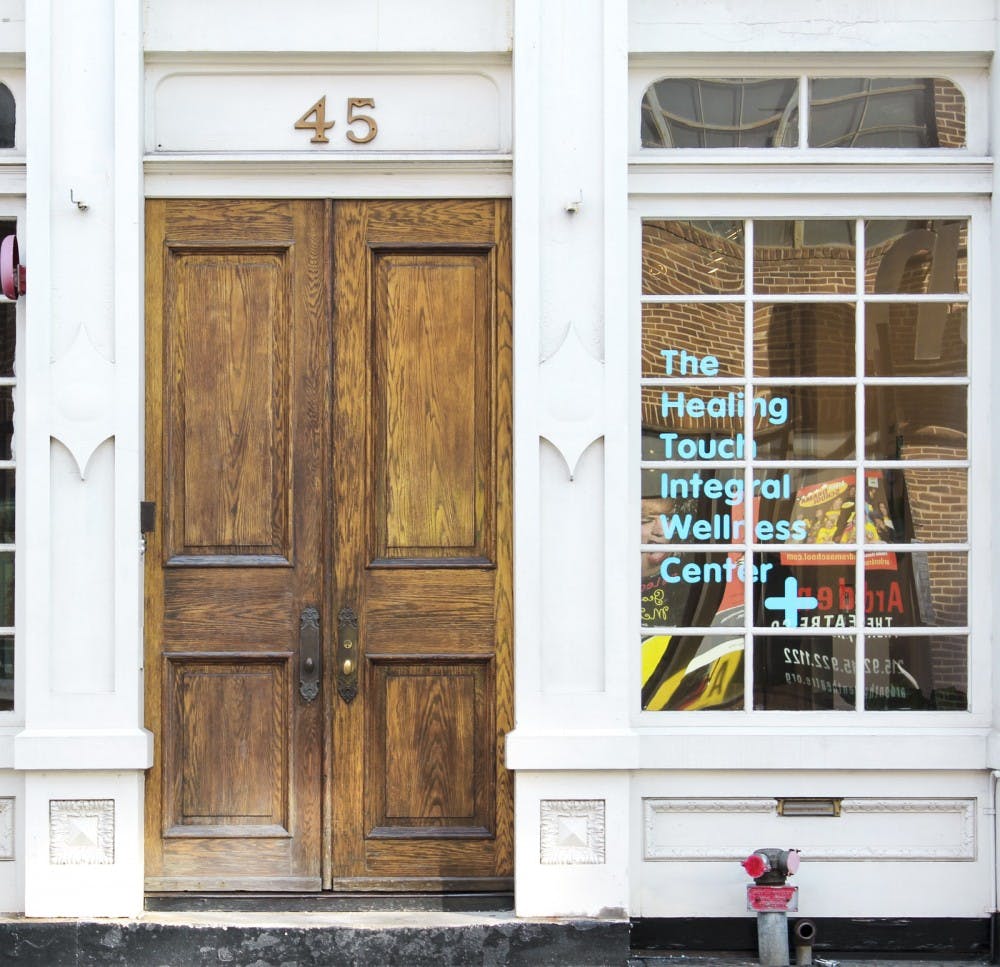"Dr." Emma Sulkowicz has changed out of her white lab coat and sits in the waiting area of The Healing Touch Integral Wellness Center wearing black from head–to–toe. She is temporarily off–duty to discuss her role as the performance artist behind her Philadelphia pseudo–clinic.
Presented by Philadelphia Contemporary, The Center claims to provide a revolutionary cure for human desire in one single treatment. While performing Carry That Weight (Mattress Performance) as a senior at Columbia, Sulkowicz was regularly confronted with various types of emotional reactions, whether anger, doubt, gratitude, or adoration. Some strangers even approached her to make intimate confessions about the sexual abuses they had suffered. The Center is therefore created as a continuation of that performance and a platform for people to fulfill those wishes.
“The history of her work has been dealing with...the violation of physical space that she experienced. This project is a way for her to turn the tables on that, so she is exploring issues of control and ownership of one’s body,” explains Harry Philbrick, founding director of Philadelphia Contemporary. In this interactive performance, visitors participate as patients in a 30–minute one–on–one session with “Dr.” Emma Sulkowicz MD, who aims to empower her clients to satiate their desires and inspire them with a new perspective on the relationship between art and the viewer. Each session is a customized treatment that starts with a medical form for the visitor to fill out, including such questions as “Are you experiencing physical pain?” and “Do you have any phobias?” After the doctor examines the responses, the patient walks into a small room and the conversation starts.

Assuming the role of a doctor, Sulkowicz is nevertheless critical about the method of psychiatry, which is usually a mix of talking cure and medicine. Responding to corrupted psychiatrists who only care about prescribing pills, Sulkowicz wanted to make an art piece that is more unique to the individual. “In Western medicine, we all think that there’s one pill that can cure all these things, but if art has a different way of healing than a pill can, then art can be many different things to each person depending on what they need," she explains.
As Philbrick points out, “The more we experience culture in a mass way, through social media and mass media, I think people actually hunger for the unique individual experience…[Emma] is beginning to get an understanding of the diverse ways that people relate to art and find either solace, simulation, excitement or reflection…a whole range of different kinds of powerful experiences with art.”
To Sulkowicz, art can be a tool that brings out emotions and creates compassion among people, healing us through unification. She reflected on her experience with a school therapist when she first reported her sexual assault in college:
“She was like, ‘We could get you to the point where you feel so okay that you could be in the same room as your attacker again'," Emma said. "And I was like, ‘I don’t want that!’ I feel like in schools especially, wellness is equated with moving on.” Challenging this mindset, Sulkowicz designed The Center as an art piece as well as a healing space for people to understand their feelings and share their vulnerabilities, rather than put up with them. Essentially, the “treatment” she provides is an exercise of sensitivity. “If we can create a culture where everyone is sensitive towards each other, there will be less harm and less evil,” she says.
Trying to elevate the value of emotional intelligence in society, Sulkowicz also points out a feminist component in this performance piece. “I feel like what the society has agreed upon is feminine is that women are supposed to be emotional and irrational, while men are supposed to be...less in touch with their emotions...I feel frustrated that we don’t cherish the same types of ‘feminine intelligences’ in the way that we cherish those ‘masculine intelligences,’’’ she says.
By prioritizing feelings over logic, The Center not only challenges the stereotypical binary between feminine emotionality and masculine rationality, but also addresses the limitation of science, which, in Sulkowicz’s words, is “so bound up with the power of patriarchy.” Citing Michel Foucault as one of her favorite philosophers, she acknowledges that when science claims power, it has to suppress other ways of knowing. As a result, she believes that there are certain types of knowledge that the “masculine” and scientific way of thinking cannot describe, which is emotional intelligence. Using the rape kit as an example, Sulkowicz says, “You can’t tell the emotional state of the person...Science can only go so far, especially when we try to figure out trauma...I’m trying to show that science [and pharmaceutical medicine] doesn’t always work and sometimes emotional sensitivity is the best way to go about things.”
Although it's in the form of a parafictional clinic, The Healing Touch Integral Wellness Center facilitates genuine conversations and challenges the idea of what “real” remedies should be.
Image: The Healing Touch Integral Wellness Center at 45 N 2nd Street, Philadelphia. Photo: Emily Belshaw for Philadelphia Contemporary, January 2017.

